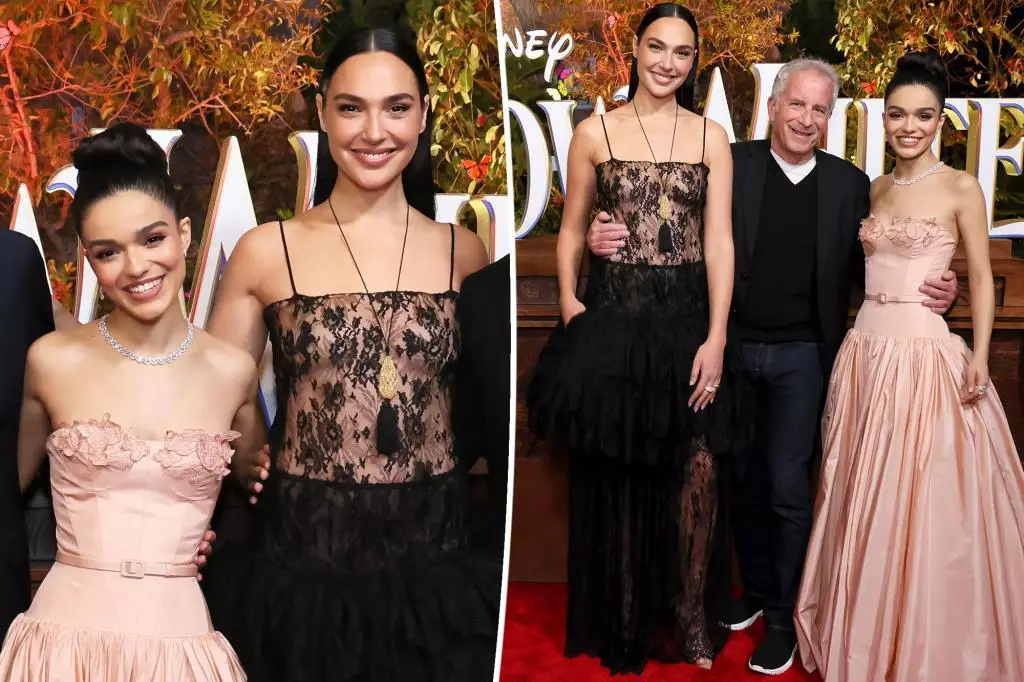At the recent premiere of Disney’s live-action adaptation of “Snow White,” held at the iconic El Capitan Theatre in Hollywood, two of the film’s stars, Gal Gadot and Rachel Zegler, turned heads with their striking red-carpet appearances. However, beneath the glitz and glamour lies a complex web of personal and political disagreements that adds a layer of intrigue to an already highly-anticipated film. While they stood side by side, radiating brightness with their smiles, the underlying tension spoke volumes about the challenges celebrity duos can face beyond their on-screen portrayals.
Zegler, as the titular Snow White, dazzled in her light pink strapless gown with intricate butterfly appliqués that highlighted her status as a young star on the rise. Meanwhile, Gadot, embodying the menacing Evil Queen, showcased her striking presence in a sheer black lace ensemble, reinforcing her image as a powerful figure in Hollywood. Their fashion choices alone could spark interest, but the narrative of their diverging paths invites scrutiny of what happens when two actors come together under one project with conflicting beliefs.
A Rift Rooted in Ideology and Age
Reports have surfaced that Gadot and Zegler share little beyond their acting careers, with sources alleging that differing political views and a significant age gap contribute to their disconnect. Gadot’s unwavering support for Israel, stemming from her upbringing and military service, clashes sharply with Zegler’s vocal advocacy for Palestinian rights amidst the Israel-Hamas conflict. Such polarizing positions create a stark contrast that inevitably seeps into their public interactions.
The notion that age gaps impact relationships is not new, but when fueled by contentious social issues, it can further complicate dynamics. Gadot, at 39, is a mother of four, while Zegler, at just 23, has a different lifestyle and worldview shaped by a generational shift. This disparity extends beyond mere numbers—it’s also reflective of how each individual perceives society’s challenges. As Zegler has criticized the romantic undertones of the original “Snow White” narrative, labeling it problematic, Gadot seems to represent a traditionalist perspective, thus crystallizing their differences.
Public Perception and the “Woke” Debate
Amidst the backdrop of political and personal rifts, the two actresses have found themselves at the center of an ongoing cultural debate regarding the film’s reception. Zegler’s comments about the original movie’s portrayal of relationships, describing them as “stalker-like,” have been met with criticism that frames the remake as ‘too woke.’ Meanwhile, Gadot has found herself annoyed by distractions surrounding the film’s promotion. This conflict raises intriguing questions about the ongoing discourse surrounding feminist narratives and modern interpretations of classic tales.
Surely, a film rooted in fairy-tale tropes can still hold modern significance—yet how the leads approach and promote the story remains contentious. Zegler’s readiness to challenge the original’s problematic elements contrasts sharply with Gadot’s apparent commitment to upholding its legacy, adding another layer of friction to their collaboration.
The Premiere: A Controlled Environment
Further complicating their relationship is the fact that the premiere itself was a scaled-back affair, with limited media presence according to reports. Disney made concerted efforts to focus the narrative through controlled elements, only allowing their own crew to conduct interviews. This approach may have stemmed from the apprehension of potential controversial exchanges, given the charged climate surrounding the film and its stars.
As such, both actresses were likely aware that every smile and photograph was being scrutinized, heightening the stakes of their public interaction. Yet, the tension in the air hints at the reality that while they can pose together and promote their film, there’s an underlying complexity that adds poignancy to the glimmer of their superficial camaraderie.
In Hollywood, the duality of public and private personas can often lead to juxtaposed narratives. For Gadot and Zegler, their separate values and perspectives not only make for captivating headlines but also invite deeper reflections on the nature of collaboration in an increasingly polarized world. Rather than a seamless partnership, their relationship casts light on the myriad challenges actors can face, reminding audiences that behind the allure of stardom lies a landscape fraught with personal and ideological conflicts.

